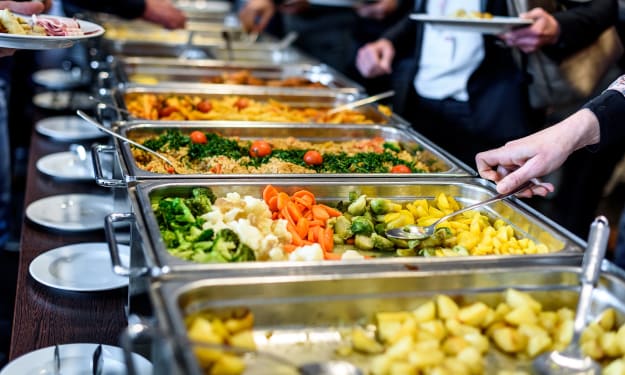The Truth of What Makes Anorexia and Bulimia so Difficult to Recover From
The deeper down the rabbit hole, the harder it is to climb out.

"Just eat, it’s really not that hard." It’s the proverbial statement many Americans use to shame people with anorexia nervosa. Simply eat and you’ll cure the eating disorder. They have no idea. It saddens me to think people really believe eating disorders such as bulimia and anorexia are about vanity, attention seeking, and simple to overcome. But I can’t be bitter; we can only see the exterior of things until we’re in it. I’m here, to dispel the fact from the fiction, because the stigma has been carried out for too long, and it's time to reveal what's underneath. I’ve had an anorexia for five years, and I’d say looks play about 20 percent or less of the total equation. I want to add, it’s total and utter hell.
What people fail to realize from the get-go is it starts with a profound amount of trauma. Eating disorders don’t happen overnight because someone decided they’ll starve or purge to be thin, or binge until they felt nauseous, it actually takes a huge accumulation of societal pressure, traumas, having biological vulnerabilities, and certain personality traits to get the ball rolling or get the pot boiling. It can be something as simple as someone calling you "fat" that tips the scale and has you putting fingers down your throat for the first time. It can be an alcoholic parent berating you constantly or a strict family who expects too much of you or controls your life decisions. Whatever the case, the root is a consistent feeling of unworthiness, instability, and lack of control of the environment/situation. In my case, I had an abusive friend, had acid reflux from dancing with too much in my stomach, and moving every semester.
What do eating disorders do...
What do eating disorders do for you? Or for anyone really? From the outside, someone may think, “Why would anyone think puking or starving, or even bingeing could be helpful and addictive when it looks like pure self-destruction and feels awful?” When you could die of heart failure, esophagus rupture, or hip displacement? When it can cause osteoporosis, ruin your teeth enamels, make you feel faint or cause you to pass out, give you heart problems, and a list of other side effects that are potentially dangerous and life-threatening? It’s because eating disorders, no matter which type, are an escape. They serve extreme ways to cope for daily distresses, big and small.
It’s a complicated relationship with them that makes them so addictive and hard to detach from even when the abuse is gone (or not gone); the head rush and adrenaline, the critical and abusive voices that come with eating disorders that convince you you’re nothing if you eat, and that you’re something when you don’t, the control you feel, the physical short-term euphoria your body gives out whether you've eaten too much or too little. The amount of positive reinforcement of praise you receive from strangers for being skinny, which, only encourages you to continue destroying yourself.
Ultimately, they are so hard to detangle from because they serve a multitude of purposes. They give you a new identity, from nothing to feeling like you’re something if you follow instructions of further torture. Why else would people compliment on your looks now and not before? People will say you’re doing a great job dieting, or they like your new weight, or if you’re too skinny, they will still take notice of you. You’re no longer invisible. They hook you with this idea of perfection you finally think is reachable, but just an inch away, it'll insist "You're so close." They put order in a word filled with chaos, despite them being chaos themselves. They numb your feelings so you feel like no one can touch you. They give you a fake sense of pride and even confidence that you lacked before, at least for a while. In fact, they fill a lot of areas of hurt or things you perceive you lack. To some it may sound crazy, but an eating disorder can serve as their best friend, and worst enemy, all at once.
So when it’s time to recover, when you know you’ve gone too far or you merely can’t take it anymore, or you think there has to be another way to deal with everything you’ve been through, you feel stuck. Your real identity is entangled with the eating disorder, so you don’t know who you are without it, or how to cope without its help. The rush of past hurts then comes flooding back, and they’re raw and tender when you’re on the path of recovery. Not to mention, your stomach has become so small and deregulated, so refeeding it to expand to a normal size not only is physically painful, but causes bloating, which can further make you want to revert to old ways. I’m not trying to discourage you, if you have or know someone who has an eating disorder. I’m just telling you the truth of the matter. Is recovery possible? Yes, but it’s hard.
So when you see or know someone who’s suffering with an eating disorder, know and feel empathy for all the pain they’ve been through. And all the pain they're in now, too. I even dare you to even reach out to them and try to be their friend, because part of the illness thrives in isolation. And, if you're the one with the eating disorder, I challenge you to be kind to yourself. You deserve everything in life, and more. Your struggles? They don't and will never define you. You are pure, and you are wonderful.
And you are enough.
Author's Note
Hey wonderful reader, thanks for reading! Also, thanks for opening your mind to educating yourself further about this debilitating illness. If you liked this piece, please share this article to spread eating disorder awareness. If you or someone you know has eating disorder, please seek out help immediately.
To find out more, here are some resources to consider:
https://www.eatingdisorderfoundation.org/https://www.nationaleatingdisorders.org/https://www.nationaleatingdisorders.org/find-treatment/treatment-and-support-groupshttps://www.psychologytoday.com/us/conditions/anorexia-nervosahttps://www.psychologytoday.com/us/conditions/bulimia-nervosaBest!
Ana N.
About the Creator
Ana Navarro
Hi there! I'm Ana, and I have an insatiable curiosity and creative appetite. I love crafting up stories and articles that bring awareness to certain topics and enrich the mind.






Comments
There are no comments for this story
Be the first to respond and start the conversation.